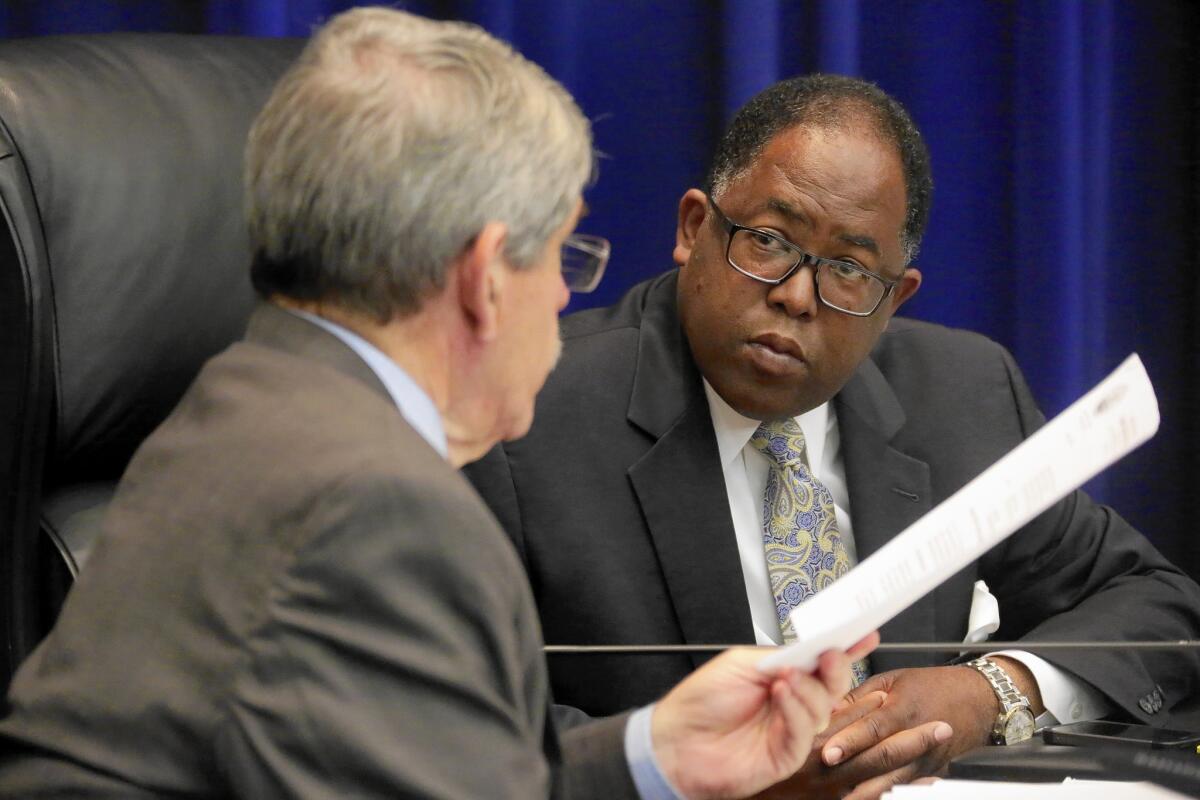L.A. County officials reject civilian board for Sheriff’s Department

- Share via
Los Angeles County supervisors defeated a proposal to create a civilian oversight body for the Sheriff’s Department, which has been beset by scandals and federal investigations into the treatment of jail inmates.
The action Tuesday, which came nearly a year after Supervisors Mark Ridley-Thomas and Gloria Molina first proposed a civilian commission, may be only a temporary setback, however. The swing vote was cast by termed-out Supervisor Zev Yaroslavsky. Both candidates to replace him in the November general election — Sheila Kuehl and Bobby Shriver — have said they favor such a commission.
The vote came after advocates — dozens of whom spoke at the Board of Supervisors meeting — argued that civilian oversight is the only way to hold members of the nation’s largest sheriff’s department accountable.
“What’s lacking is a sense of trust that things are moving forward,” Rabbi Marc Dworkin said. “This community needs to be included.”
But a majority of supervisors first want to focus on setting up the newly created inspector general’s office for the Sheriff’s Department. They also pointed out that under existing law, a civilian commission would lack authority over the elected sheriff.
“No one said reform should be easy, but it shouldn’t be as difficult as this,” Ridley-Thomas said after the vote. “The delay is not helpful and sends the wrong message to the federal government. We need real reform, and we made it harder for ourselves rather than easier.”
Molina and Ridley-Thomas voted for the civilian commission, and Yaroslavsky joined Supervisors Michael D. Antonovich and Don Knabe in opposition.
“Adding another committee with no control or power I really believe will get us nowhere,” Knabe said.
Knabe said he would favor moving forward with a civilian committee if the inspector general did not work out.
Patrisse Cullors, executive director of Dignity and Power Now, called the board’s decision “pathetic,” especially considering the large turnout in favor of civilian oversight.
“A hundred speakers speak, and the people who get listened to are the bureaucrats, and that’s shameful,” she said.
Also Tuesday, the board approved a plan for the structure, staffing and responsibilities of the inspector general’s office.
Interim Sheriff John Scott, who replaced the recently retired Lee Baca, has pushed for the board to set up an attorney-client relationship between his department and the inspector general so he could feel comfortable sharing confidential documents and know that the information would not be made public.
But the supervisors objected, saying that would harm the inspector’s independence. They instead approved a structure that would give the inspector general an attorney-client relationship with the board and not with the sheriff. The inspector generals of the Los Angeles and New York City police departments do not operate under attorney-client privilege.
Inspector General Max Huntsman told the board he was still trying to negotiate “complete access” to department investigations into deputy-involved shootings and other issues. He cited an incident last weekend in which a deputy inadvertently shot an innocent bystander during a hostage standoff in Pico Rivera.
“There’s an investigation going on that I don’t have access to,” Huntsman said.
Yaroslavsky said in an interview that the board would use its bully pulpit, if necessary, to push for the inspector general to have full access to documents and information.
“It’s a critical element of this, and if the inspector general does not get access to information, then the whole idea is stillborn,” he said.
In a statement, Scott said he supported the board’s plan “in substantial part” and had requested a formal opinion from county attorneys about how the Sheriff’s Department should handle confidential information.
“We will continue to work with Max Huntsman and his office in an effort to build a climate of trust and transparency within the organization and the public,” Scott said.
Long Beach Police Chief Jim McDonnell, the front-runner to become the next sheriff in the Nov. 4 general election, also supports a civilian oversight commission. Based on his experience at the Los Angeles Police Department, where he previously served, he said the inspector general should be able to function well without attorney-client privilege.
“The LAPD didn’t have attorney-client privilege, and it didn’t seem to be a problem,” McDonnell said.
abby.sewell@latimes.com
cindy.chang@latimes.com
More to Read
Sign up for Essential California
The most important California stories and recommendations in your inbox every morning.
You may occasionally receive promotional content from the Los Angeles Times.












